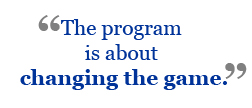Verizon: Can You Hear Me Now?
At Verizon, leadership is personal. Chairman and CEO Ivan Seidenberg has long focused on creating a culture where all employees, and especially leaders, are highly and personally accountable for owning their roles, achieving high-performance results and providing the best service for customers.
But both Seidenberg and Verizon President and COO Denny Strigl also stress that strong leadership must be a key organizational capability for the firm. Verizon’s success, they believe, should not depend on individual superstars, but rather on the depth and strength of the entire leadership team and on how its members work together to achieve results.
In addition, Seidenberg has clearly stated that success at Verizon means accelerating growth. The company comprises several business groups which serve wireless, wireline and enterprise customers. To accelerate growth, he says, Verizon has to find opportunities that cut across these business groups to leverage its portfolio of high-tech assets … while still holding its leaders accountable for growing their businesses “vertically.”
To achieve that growth, Seidenberg believes that leaders have to step up to a new level of accountability and collaboration.
So how does the company address the inherent tension between the two? That’s where Duke Corporate Education fits in.
New Game/New Rules
Verizon University and Duke Corporate Education created an intense one-day program called “Accelerating Growth” that focuses Verizon’s top leaders on creating the mindset of capturing growth and value across the company.
 Jeannie Diefenderfer, senior vice president of operations, appreciates the program because it brings senior managers together and gets them to look outside their own tactical view.
Jeannie Diefenderfer, senior vice president of operations, appreciates the program because it brings senior managers together and gets them to look outside their own tactical view.
“I was told from the day I started that loyalty is our No. 1 obligation,” she said. “Loyalty and collaboration — protecting each other. Great things, but over-valuing loyalty means you don’t want to be that good.
“If you look at an org chart, most of it is white space. We push the boxes around, but most companies traditionally have not done a good job of managing that white space.”
Of course even though leaders would prefer it to be otherwise, few people, Diefenderfer admits, actually thrive on change. The Duke CE program is helping.
“The program is about changing the game,” she said. “Rather than helping us get better at what we already do, the class drives us to stimulate our curiosity and questioning. And it uses a powerful combination of quantitative metrics and qualitative statements that force us to think differently about our strategy.”
Diefenderfer wondered, however, how to carry the learning back to the job. “Once we all go back to our respective organizations, how much courage and strength do we individually have to continue that dialogue among ourselves?”
One answer: She and her cadre chose, on their own, to keep meeting for a full year after the program so they wouldn’t lose momentum.
Embracing Organizational Conflict
In visits across the company Strigl has stressed that leaders must take action and be personally accountable for fixing the root cause of problems no matter how far outside their own area of responsibility the problem lies.
He has instilled the mantra of “you touch it, you own it” to leaders and employees across the company.
To live that charge, leaders inevitably must interact with colleagues across the company, and that’s when personal accountability and collaboration sometimes collide. Still, Strigl wants leaders to act. Simply put, success will come, he says, when leaders “embrace organizational conflict.”
The program from Duke CE addresses this issue as well. Lee Brathwaite, who serves as vice president of real estate affirmed the value of the “Accelerating Growth” class, noting that he was pleased employees in his group would be attending the new Verizon/Duke CE program for directors—“Leading for Growth.”
“They need to understand the company’s subcultures and interdependencies because it will help them face up to the uncomfortable conversations that need to happen,” Brathwaite said.
Seidenberg believes the company’s culture, as well as business results, will be enhanced when leaders can work together and step outside their prescribed roles.
In courses like “Accelerating Growth” and others he interacts closely with Duke CE experts and key Verizon executives, demonstrating his personal commitment to pushing his leadership to find new solutions.
New Solutions/ New Leadership
So what does success look like when you’re trying to grow a leadership culture rather than just create a leadership pipeline? It looks a lot like Verizon, a company that believes in leadership as both an individual obligation and organization capability.
Though the company has received its fair share of external recognition for its senior leaders, Seidenberg and Strigl don’t focus on trumpeting their personal brand.
Jane Clements, vice president of corporate talent and leadership management, notes that Seidenberg and Strigl invest significant time on senior leader talent reviews to develop Verizon’s bench strength and ensure that they are creating the culture of leadership which will take the company to a new level.
“Thinking beyond yourself and beyond your organization is really thinking like a leader,” says Diefenderfer. “We’re trying to get there, and this program is the right next step.”
